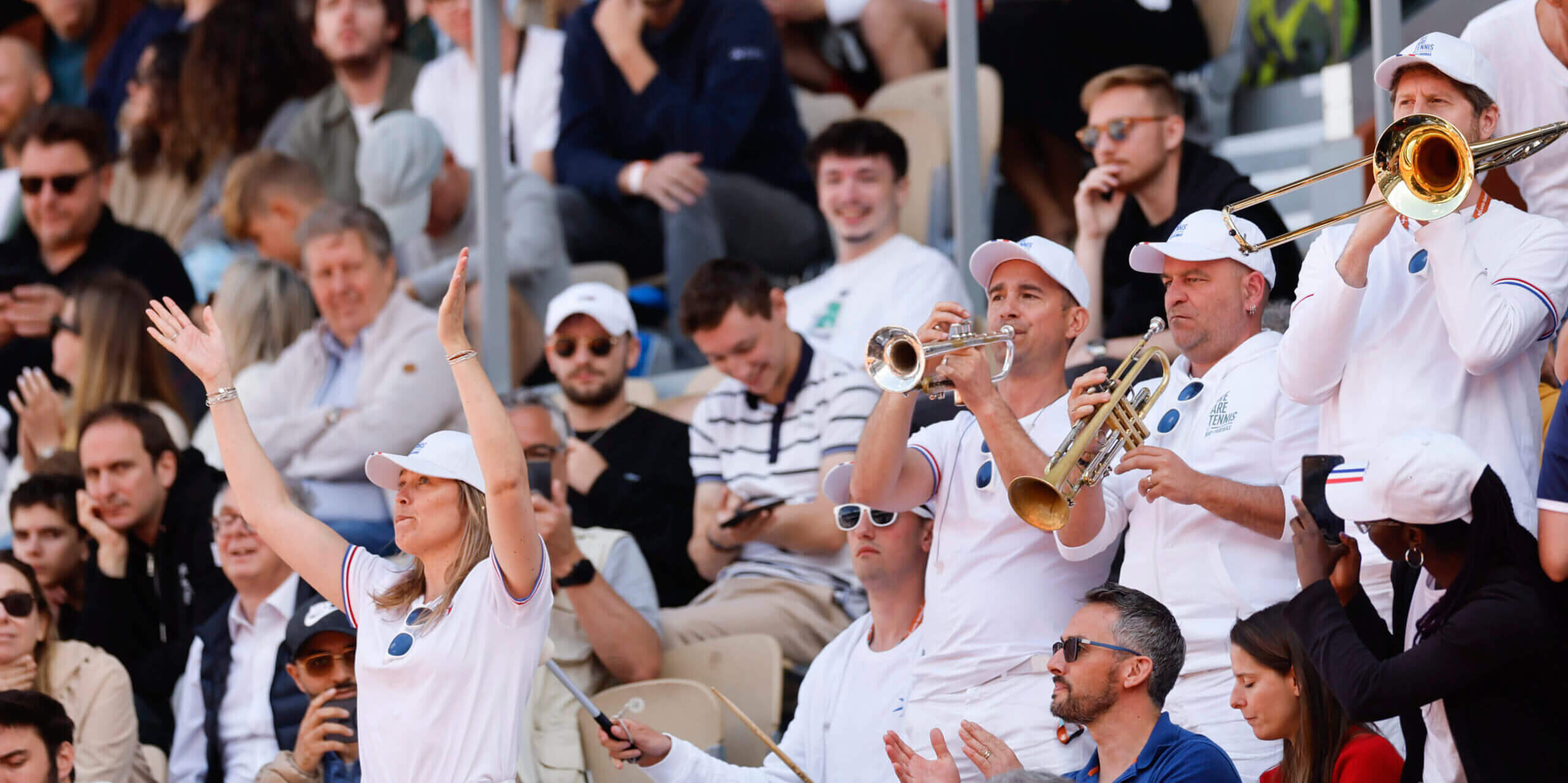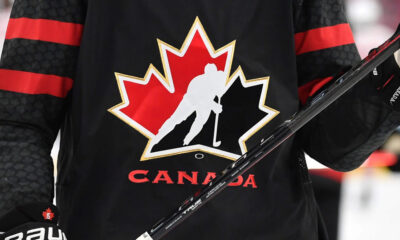Sports
Tennis crowd and etiquette: how should fans behave and how should players react?

Let’s start with the brass band.
That’s what caught Ben Shelton off guard when he walked onto the court on Sunday to face France’s Hugo Gaston. The venue was Court 14: a sunken stage that can very quickly become a suffocating cauldron of noise and chaos if the opponent is a native son.
“This is the first time I go to a tennis match and see a band playing in the stands on my court,” Shelton said. Shelton, the 15th seed at this year’s French Open, is no stranger to rowdy crowds; he played two years of college tennis at the University of Florida. Away games at Kentucky, Tennessee and Georgia were particularly nasty, he said.
“If you play in the SEC (Southeastern Conference), all bets are off.”
If the bets on campus don’t happen, they will be at Roland Garros somewhere in the Seine. The band played throughout the match, a bass drum thumping and rhythmically clapping, while the trumpets and horns honked, bringing the thousands of people who were just standing to their feet to shake Shelton into as many errors and mistakes as they could. .
This is how tennis rolls at the French Open, turning a chic sport known for its etiquette-obsessed fans into the frenzy of football matches.
It’s not everyone’s cup of tea. The gentlemen of Wimbledon would have none of it, and the All England Club has long set the standards for much of the sport. But these are just two of the few weeks during the tennis season when a tournament reminds a sport that it does not have to conform to the standards of Victorian-era Britain.
A raucous crowd headlined this year’s tournament (Richard Callis/Eurasia Sport Images/Getty Images)
Both players and fans might enjoy themselves a little more.

“TThey are really looking forward to it and I had the feeling that they really enjoy tennis,” said Denis Shapovalov, a Canadian who received similar treatment later that evening when he took on Frenchman Luca Van Assche on the same court a few hours later . A huge Toronto Maple Leafs fan, Shapovalov is no stranger to the drunken and rowdy crowds at sporting events – just not the ones in which he plays.
“Quite fun as a tennis player, even if it was against me.”
After a series of pressure-cooker confrontations in the early rounds, tennis players and fans are once again forced to adhere to the current rules of the game. At its best, tennis is a sport that evokes uncontrollable emotions, from awe and ecstasy to desolation and pain. Fans going through these emotions are expected not to show them – at least until a point is over – and even then not to show too much.
Borders are being crossed and in Paris players who are not from France are the victims. Belgian David Goffin was suitably salty after his five-set win over Frenchman Giovanni Mpetshi Perricard on Tuesday night, cupping the crowd for just seconds after they spent more than three and a half hours taunting him.
The Parisians have form. Taylor Fritz ran around the field with his finger to his lips after toppling France’s Arthur Rinderknech last year, shouting, inaudibly amid the din of boos, that he wanted them to “let me hear it!”
Goffin was a little more nervous.
“It goes too far, it’s total disrespect,” the soft-spoken Belgian told reporters from his country after the match. He claimed a fan spit chewing gum at him.
“Soon there will be smoke bombs, hooligans and fights in the stands.” He compared that behavior to that of football fans – the implication being that it simply has no place in tennis.

Goffin gave back (Benoit Doppagne/Belga Mag/AFP via Getty Images)
World No. 1 Iga Swiatek gently scolded the Court Philippe-Chatrier crowd on Wednesday for making noise in the middle of the points as she prevailed over Naomi Osaka in three sets in a gripping encounter.

Swiatek understands the enthusiasm of the French crowd, she said, but there is decorum in tennis, the expectation of silence in the audience, although many of her peers, namely Frances Tiafoe, believe this concept should have disappeared long ago. Swiatek read between the lines and although she discussed the topic in general, she was really only talking about one point: when she went for a regulation drive forehand volley deep in the third set against Osaka, someone shouted out as she hit the ball. speech. She missed the volley.
If tennis players were constantly exposed to sounds of varying pitch and intensity, tailored to the contours of their rallies – just like in almost every other sport – this kind of thing wouldn’t be a problem.
When a sigh comes from a vacuum, it is much more shocking.
“I just wanted to point out that it’s not easy for us,” Swiatek said. “The French public can be quite harsh, so I don’t want to go under the radar now. I don’t know if that was a good decision or not, but I hope they can treat me like a human being.”
All this has caused a stir at the French Open, with tournament director Amelie Mauresmo saying on Thursday that she would no longer allow spectators to drink alcohol in the stands. Referees and security officials have been warned to combat unruly behavior.
But fans becoming emotional in the middle of a point is not a criminal offense as long as it is not done intentionally to scare a specific player.
“If you throw something at a player, it’s black and white and you’re out,” Mauresmo said. “Expressing emotions, during a point, is not the same.”
Given the unique nature of the French Open, it’s also difficult to say whether this is all a genuine referendum on the nature of spectatorship, or rather an occupational hazard of spending a fortnight in the City of Light. Home field advantage is as old as sports and warfare, and there is something inherently unfair about tennis. Players from just four countries – Australia, France, the United Kingdom and the United States – can experience home field advantage at the Grand Slams, the sport’s premier events.

Home favorite Caroline Garcia even got a portrait last year (Robert Prange/Getty Images)
Everyone else has to make do with the extra image of a home crowd (and its proven effects on referees and umpires) at tournaments that don’t mean nearly as much and offer much less prize money. The circumstances at this year’s tournament are also a bit strange.
Rafael Nadal vs. Alexander Zverev and Swiatek vs. Osaka are not your typical first and second round matches; These are the occasions fans are used to seeing in semi-finals and finals, when the danger is at its peak and emotions are at their highest. When Andy Murray won his first Wimbledon final against Novak Djokovic in 2013, the entire Center Court crowd let out a whoop on match point as Djokovic’s first ball flew high and deep into the air, and an awed gasp when it failed to land. but inside. He sent the ball back to Murray. Murray returned the favor.
Djokovic put the next ball in the net.
The room exploded.

Murray in the crowd after his 2013 Wimbledon victory (Julian Finney/Getty Images)
Petar Popovic, Corentin Moutet’s coach, bet all the money on a first-round match against Nicolas Jarry, a powerful Chilean who had advanced to the final in Rome. In February, a partisan crowd in Chile, where they play rowdy tennis like everyone else, made Moutet’s life quite miserable. Popovic told the press that he wanted the French public to take revenge. And so they did, slamming Jarry for every mistake and error, breaking his concentration and his spirit and turning Court Simonne-Mathieu into a Roman amphitheater. Moutet triumphed in four sets, including 6-0 in the last.
This encouraging support can only do so much. The last French woman to win the French Open was Mary Pierce in 2000. A French man has not won since Yannick Noah in 1983. Other players are simply better.
Let’s get back to the tape.
They are part of La Banda Paname, a collection of approximately 50 musicians who provide atmosphere and entertainment at various sporting events in the region. BNP Paribas, the international bank that is one of the largest sponsors of tennis and the French Open, has them on its payroll here, under the name “We Are Tennis”. They are completely white, with matching polo shirts with logo.
“We started at Queen’s Club for the Davis Cup against Great Britain in 2015,” said Vincent Raymond, who was part of the five-man squad on Tuesday.
“Andy Murray punished us.”

Strumming a tune (AP Photo/Jean-Francois Badias)
Raymond was accompanied by band members Julian, Brice, Nicholas and Yohann: two trumpets, drums, a trombone, a flugabone and a presenter/conductor. Their mandate, he said, is to make noise, support France and support sport. They have reserved seats all over the grounds so they can bounce from court to court.
As French tennis goes, that means going wherever France needs them in the first week. Usually the French players are out of the tournament after that. “Then we change our strategy,” Raymond said. “We want to create a fair playing atmosphere. It is tennis after all. The key is to stop playing before the referee says nothing more.
However, the band can only control what they can control. Once they get the crowd going, all bets are off, especially on Court Suzanne-Lenglen, the jewel of a 10,000-seat arena, where Argentina’s Tomas Martin Etcheverry took on the rising 21-year-old Arthur Cazaux in the first round. year old Frenchman. .
Cazaux won the first set in a hurry, then fell off a cliff and lost the next two. He was still hit midway through the third, after a break of service and seemingly minutes away from defeat. His shoulders slumped, his legs dragged.
When Cazaux came back onto the field after a substitution, the crowd got louder than it had been all day, with a lot of help from that band. A group of Cazaux’s friends, sitting just above the back of the field, exchanged chants and arm pumps with fans on the other side of the stadium, as if they had been practicing for months.
Etcheverry took a few deep breaths and served.
Debt.
More chants. More screaming. A short chorus.
Another mistake.
Within minutes the crowd had manifested a break for Cazaux. He couldn’t hold his serve, so they manifested another one for him.
“I got a second breath thanks to the audience, so thanks to them,” Cazaux said later. “I like this kind of atmosphere.”
Then that chorus: “It’s like a football game.”
Etcheverry said the atmosphere was as loud as it could be.
“I often play against French boys,” he said. “It’s tough, every moment.”
Unfortunately, it wasn’t heavy enough. Cazaux fell in four sets, the crowd screaming until the last moment, and then some after that.
The band checked the schedule and moved to another court.
(Top photo: AP Photo/Jean-Francois Badias)













